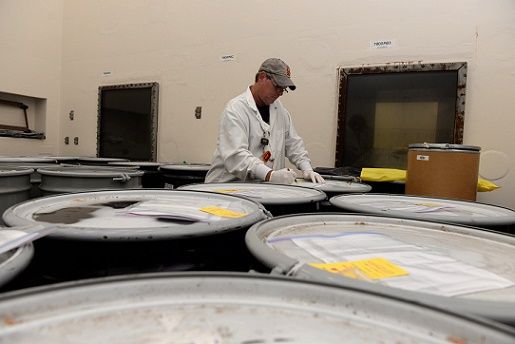Conflicting regulations stemming from two different government departments are causing problems for municipalities. Esbjerg has fallen foul of the system over the storage of so-called ‘NORM’ waste (naturally occurring radioactive material) by Total, which recently bought the rights to drill for North Sea oil from Maersk Oil, reports Ingeniøren.
Before proceeding, Total asked the municipality whether an environmental assessment of the waste dump was necessary. The municipality then contacted the environmental authority, Miljøstyrelsen, the body that has to approve these assessments. But in the meantime, the Sundhedsstyrelsen health authority, the body responsible for dealing with radioactive material, had already approved the waste dump.
“The environmental authority told us approval is not necessary but that an environmental assessment should be carried out. That seems a bit odd to us because it is the health authority that is ultimately responsible,” said Jesper Frost Rasmussen, the mayor of Esbjerg. Even if companies and the municipality want to do things by the book, it is not easy without a national strategy to cover this area, adds the mayor.
The health authorities insist it is the company in question that is responsible for making sure that NORM is stored and handled safely according to the existing environmental laws. Up until now, eight NORM storage facilities have been approved in six different municipalities.
Sugars essential for removing ‘bad’ cholesterol
Sugars play a decisive role in how cells absorb and get rid of the body’s ‘bad’ cholesterol, low density lipoprotein (LDL), new research from the University of Copenhagen reveals. The researchers found that the sugars increase the body’s ability to absorb cholesterol by up to five times. LDL is associated with the accumulation of fat in the circulatory system and so the body tries to remove it by absorbing it into the cells. “We’ve known for a long time that cell receptors play a role regarding how much cholesterol a cell can absorb, but the new thing is that we now know that the sugars in the receptors play a decisive role,” said Katrine Schjoldager, an associate professor at the centre for glycomics at Copenhagen’s Instutite of Cellular and Molecular Medicine.
New study adds to number of genes responsible for depression
A new analysis of 135,000 Danes suffering from depression carried out by researchers at Aarhus University has identified 30 new genes connected to depression. This brings the total up to 44 so far. It is estimated that around 500,000 Danes suffer from the affliction, which is considered one of the biggest health problems worldwide. Understanding more about these genes will pave the way to developing more focused and effective treatments, researchers hope.
DTU in top ten of ‘most innovative universities’
A rankings list drawn up by Reuters has placed the Technical University of Denmark (DTU) at number nine in Europe and number one in the Nordics when it comes to the most innovative universities. DTU has gone up five places on the ‘Reuters Top 100: Europe’s Most Innovative Universities’ list since the last one was compiled. In order to be considered in the rankings, an institution needed to have a minimum of 50 filed patents during the period 2011-2016. Among the other indicators are the patent to article citation impact and the percentage of industry collaborative articles. Three of the universities DTU collaborates with also made the list: Ecole Polytechnique Fédérale de Lausanne (EPFL) at number four, Technical University of Munich (TUM) at number six and Eindhoven University of Technology (TU/e) at number 23.
Robot arm causes fatal accident
Funen’s police announced that a 27-year-old man was killed on Monday evening when he became trapped between a robot arm and an electric cabinet. The man seems to have climbed over a security device and been hit in the chest by the robot arm resulting in his ribcage being crushed on the cabinet, reports Mester Tidende. The Arbejdstilsynet working environment authority is investigating the circumstances surrounding the accident, and the company has been told that they can’t use the robot arm for the time being.















